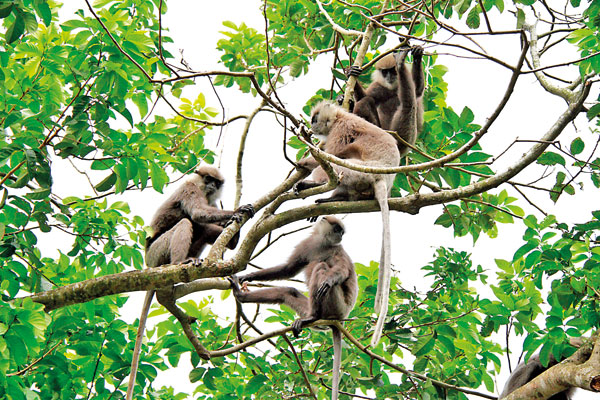News
Pest animals still plague farmers as census proves useless without follow-up
View(s):By Kasun Warakapitiya
Residents of areas where wild animals abound complain that the crop pest census in March to count macaques and langurs, peacocks and giant squirrels, was a useless exercise, as there was no follow-up action.
Macaques continue to raid houses in search of food and decimate their crops, but the authorities are yet to take action, they say.
The islandwide pest animal census was on March 15, 2025, from 8.00 am to 8.05 am, involving residents, house owners, and farmers.
The census was done by distributing a sliver of a census form which listed out the names of animals as rilawa, wandura, dadulena and monara. The form was to be filled in five minutes.

A group of gray langurs
The Agriculture Ministry, on June 12, 2025, released the results of the census, with ministry officials claiming that, according to the census, there are 5.17 million toque macaques, 1.4m gray langurs (Alu Wandura), 2.66m giant squirrels and 4.74m peacocks in Sri Lanka.
But researchers, environmentalists and agriculture experts reject the census, which they say is flawed and has many grey areas.
A former researcher, Taya F. Diaz, lashed out at the scientifically unfounded census mechanism.
Mr Diaz, who is a resident of the Polonnaruwa New Town area, called it a “nationwide fiasco”.
He claimed that the only favourable result that came of it was to know about the so-called ‘experts’ that blatantly duped the Ministry of Agriculture, despite the foremost scientists on the subject proposing other strategies. Sadly, they were all ignored, along with their proposals.
Mr Diaz asked that even if the pest animal census was carried out scientifically and as accurately as possible, what use would it have if there are no plans or procedures to counter conflicts with animals?
“This lack of understanding was evident from the actions that followed the pest animal census of monkeys, the toque macaque, in particular,” he said.
Toque macaques were haphazardly translocated into national parks, reserve forests and reservoir islands with state patronage. Later, the practice was picked up by ordinary people, who then caught on of their own will and released the captured monkeys in any way that was convenient to them. They translocated not just the animals but the problems to locations where there were no problems before as well.
He said that this move institutionalised an abhorrent practice which should have been made illegal at the very onset.
Mr Diaz said sterilisation or spaying has logistical problems, and he questioned whether neutered animals would not raid crops.
He said that unlike in a zoo, where there are only a few animals that can be sterilised, this is not so in the wild.
The former researcher criticised Agriculture Minister Lal Kantha’s remark, “If any animal harms your crops within your cultivated plot, just in the manner that you take action on other animals that harm your crop, you as a farmer have all the right to take any action within your cultivated area; there is no legal prohibition whatsoever.”
He said such remarks would institutionalise a gun culture in Sri Lanka.
However, Agriculture Ministry officials said the report was submitted, yet a presidential task force was formed and discussions on future actions are being held.
Hemantha Aamarasinghe, Agriculture Ministry Director (agriculture technology) and member of the Ministry-appointed Special Committee for Reducing Damages Caused by Wild Animals, said the committee report was given to the agriculture minister, and it had been sent to the Presidential Secretariat also.
According to him, a presidential task force convened under the agriculture ministry secretary, and discussions are ongoing, and actions are being taken even though people are unaware.
Agriculture Ministry Secretary D.P. Wickremesinhe, who is the convener of the presidential task force to find solutions to control harm from crop-damaging animals, told the Sunday Times deterrents were discussed with stakeholders.
He said scientific research and studies are needed to find solutions.
“People expect us to shut down and kill the animals; that cannot be done. We need scientific methods to control the numbers. We plan to educate people so they will not feed monkeys,’’ he said.
The best way to say that you found the home of your dreams is by finding it on Hitad.lk. We have listings for apartments for sale or rent in Sri Lanka, no matter what locale you're looking for! Whether you live in Colombo, Galle, Kandy, Matara, Jaffna and more - we've got them all!

